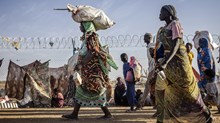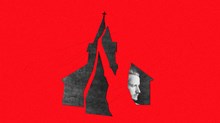The House of Representatives on Thursday voted to expand the definition of hate-crimes to include violence motivated by perceived sexual orientation, gender identity, or disability. Rep. Barney Frank, D-Mass., the only openly gay member of Congress, presided as the 237-180 vote tally was read. Already, advisers to President Bush have recommended that he veto H.R.1592.
Republican representatives offered several unsuccessful amendments. Rep. Lamar Smith asked the House to provide hate-crime protection for the elderly and members of the Armed Forces. Earlier in the House Judiciary Committee, Rep. Mike Pence proposed adding the statement, "Nothing in this section limits the religious freedom of any person or group under the Constitution."
Since 1969, federal law has authorized the government to prosecute hate-crimes related to race, color, religion, or national origin when committed in the context of "federally protected activities," such as voting or attending school. Hate-crimes accounted for 3 percent of all violent crimes in 2005, according to the most recent FBI figures. Less than 14 percent of those victims reported that they were targeted for their homosexuality. About 16 percent said perpetrators targeted their religion.
White House opposition relieved many of the bill's critics. But debate persists about the implications of hate-crimes legislation.
Many conservative Christian groups, such as Focus on the Family and Concerned Women for America (CWA), called the bill unconstitutional.
"Hate-crimes legislation is constitutionally dubious on its face," said Matt Barber, CWA's policy director for cultural issues. "[H.R. 1592] flies in the face of the 14th amendment. It clearly sets up a two-tiered justice system with a first class of victims and a second class of victims. This bill provides unequal protection under the law."
Barber contends that sexual orientation and gender identity, like religion, describe a set of behaviors and should not be specially protected. The other identities protected under current federal hate-crimes law —race, color, and national origin—are non-behavioral characteristics.
Many Christians worry the House legislation could "lead to serious infringements of our First Amendment freedom of speech protections in the United States," said Richard Land, president of the Southern Baptist Convention's Ethics and Religious Liberty Commission. Barber warned that the bill would mean that "any opposition to the homosexual lifestyle would be against the law. If a pastor or a speaker were to speak out against homosexuality and it were to incite someone to act out violently, then that [pastor] would be tried as a principal."
However, the House bill targets violent crimes, not speech, observed Charles Haynes, senior scholar at the First Amendment Center. Even aggressive action by "some rogue prosecutor" would probably not prevail unless the state could prove the pastor clearly incited a violent act, Haynes explained. "And, of course, that's illegal now," he said.
The First Amendment affords Americans tremendous protection for speech. Nevertheless, legislation recently enacted in Europe and Canada concerns many Christians. Swedish pastor Åke Green was sentenced to one month in prison after he preached against homosexuality. Yet in 2005, Sweden's Supreme Court acquitted him. "I think in Europe, the concerns [over free religious expression] are real," Haynes said.
Closer to home, opponents of the bill point to a 2004 case when police arrested and jailed 11 Christians who protested Philadelphia's Outfest, a gay-pride rally. Police charged them with "ethnic intimidation" under state hate-crime statutes that protect homosexuality. But in 2005 a judge dismissed all charges.
Though he believes much of the hysteria about the House bill is unwarranted, Haynes said Christians could rightly interpret the bill as another step to normalize homosexuality. Religious liberty and gay rights will continue to clash on issues of hiring discrimination and same-sex marriage.
"As the country moves toward more civil-rights protections [of homosexuality]," he said, "that's where the conflict is really going to come."
Copyright © 2007 Christianity Today. Click for reprint information.
Related Elsewhere:
Ted Olsen and Stan Guthrie commented on reactions to the hate-crimes bill in CT Liveblog.
Related articles include:
House roll call on hate-crimes
White House threatens to veto hate-crimes bill | House votes to extend federal protection to gender, sexual orientation. (Associated Press).
Hate crime bill veto is vowed | The House votes to expand the law for sexuality and gender bias. The White House says that's unnecessary. (The Los Angeles Times)
House Votes to Expand 'Hate Crime' Protections | The House of Representatives voted today to extend "hate crime" protection. But the most immediate effect of the bill may be to set up another veto showdown between Democrats and President Bush. (The New York Times)

Support Our Work
Subscribe to CT for less than $4.25/month


















